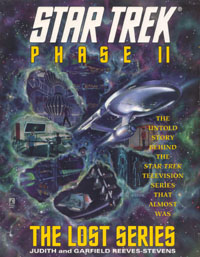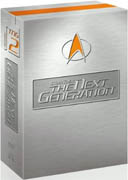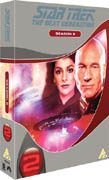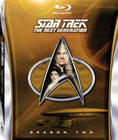The Child
This opening story for season two is a bit of a mixed bag, with a few classic really
good bits scattered throughout a decent episode that turns out a bit average in the end.
There are three real strands to this story. The most obvious is the one that gives
the episode its title "The Child", where Deanna Troi suddenly finds herself giving birth
to a young boy with greatly accelerated growth. This results in a lot of generic
heart-warming moments counterpointed by the mystery of this boy's full abilities and
agenda in coming here. It's a strange mix, resulting in much aimless second-guessing by
various members of the crew - ultimately not a great use of them during the episode.
The truth kind of falls out clumsily at the end, without the sense that the crew did anything
to earn it, or that the child was properly ready to reveal it. It's "Trekkian" in the sense
that it's a nice uplifting truth, but from a New Age perspective, it's not really any different
than the journey any soul makes anytime any of us decide to participate in physical life.
The exception to that is perhaps in the accelerated time span during which it occurs
and that no biological trace of the event remains in Troi's physiology - both of which purely feel
like predictable conveniences for the sake of Trek's typical allotted story-time for an episode and the
practice of putting all regular characters back to their starting positions by the episode's end.
Somehow, this concept just feels like it went through some kind of filter and came out all bland,
with nothing of true interest sticking to it.
Another plot strand is here to give the episode some sense of urgent purpose, as the Enterprise
is once more engaged to transport dangerous medical samples required to help cure some disease
on some planet somewhere. These bits have an uneven quality about them, with some of the early
mentions clumsily appearing as silly as those of the episode "Code of Honor". Later development
of this story strand brings a much more realistic scientific understanding of the long process
of testing possible remedies, which then seems to be at odds with the urgency of moving the sample
collection. This could have used some ironing out, but ultimately I found this part of the plot
more interesting than that of Deanna's child, as it was giving many of the regular castmembers
good things to do.
|
Interestingly, this story was originally pitched and developed as a script
for the "Star Trek: Phase II" television series that eventually morphed into
"Star Trek: The Motion Picture". That prior version of "The Child" can be read
as a full script in the book mentioned to right - where Jaron Summers and Jon Povill
take all the credit. Of course, in that version,
we have Kirk, McCoy, Chekov, Uhura, and the original series crew, but with
Spock replaced by the full Vulcan Xon, and of course Will Riker's prototype
Commander Will Decker. And having the child is not half-Betazoid Deanna Troi
but her earlier prototype: the bald, celibate Deltan navigator Lieutenant Ilia.
In that script, the child was a female named Irska.
And in that version, the ship isn't involved in a completely separate medical plot strand.
Instead, it gets involved in an external situation that is very much connected to the child.
Irska gets much more to do in that version. I'm on the fence as to whether or not that
version actually works better. The central concept is a bit more focused and purposeful,
but it still feels as though it is celebrating a moot point in the end. Do moot points
deserve extra energy and exploration and screen time? Maybe TNG's unrelated medical plot,
when it worked, is still the more interesting.
|
|

 - U.S. - U.S.

 - Canada - Canada

 - U.K. - U.K.

| |
Of course, a third element in TNG's version of this story is simply a lot of housekeeping
as many of the changes
amongst the regular cast were given their due. Most obvious is the discussion of the now
absent Dr. Crusher, given a new assignment off-screen, while her replacement Dr. Pulaski
makes her entrance. Much as I love Dr. Crusher on this show, I really like Pulaski also,
and I relish her single-year stint during this season. Strange that she is always credited
as a guest star instead of getting her name into the opening titles, despite the fact that
she will only miss two episodes of the season. Pulaski makes a very memorable entrance in this
story, and gets straight to work.
Another new regular is Guinan, who makes her debut here at the beginning of season two while also
introducing us to the brand new Ten-Forward set where she tends bar. Ten-Forward proves its worth
time and again on this series, and has some particularly beautiful glory shots to start here in this
episode. I must admit, I didn't have a very favourable impression of Whoopi Goldberg until I actually
saw her here playing the wise, cool, and collected Guinan on this series. I think Guinan is one
of the best roles she ever had, and certainly one that demonstrated that her range included
many dimensions that I could appreciate.
Colm Meaney also turns up as the Transporter Chief and will begin to make regular appearances
like clockwork from now on. A few more episodes may have to go by before he gets officially
named "O'Brien" though.
One of my favourite bits of housekeeping though is Geordi's promotion to Chief Engineer
(and to full lieutenant with two solid pips).
It's about time that Enterprise D got a regular chief engineer, and Geordi made a good and
seemingly obvious fit. Worf's new position taking over Tasha Yar's functions and adding them
to his old ones also seems to get cemented into place here as he switches to a gold uniform
just like Geordi has done, although Worf remains at his original rank of lieutenant junior grade
(1.5 pips). All well and okay. But there still seem to be too many red and gold
uniforms amongst the regulars, and not enough blue. All things considered, Data probably should
have been in blue from the start.
Oddly, the housekeeping thread seems to find its strongest subplot in an item which threatens
a change, but decides to remain the same. Good character logic suggests that Wesley Crusher
should leave the ship to join his mother, and much of the episode's best material concerns the
"C" plot of him wrestling with the decision to remain aboard and a plan to make it practical.
Picard, Guinan, and many of the other regulars get their best material in this strand of the episode.
By contrast, the most that the earlier "Phase II" script had in terms of crew banter
was some truly random material of Kirk just after swimming and so forth, material which
often didn't feel like it was in character for that crew and wasn't much interesting.
TNG's housekeeping sections are far superior there.
In the end, we have here a decent and satisfying episode, but not a spectacular one.
|
|








 - U.S.
- U.S. - Canada
- Canada - U.K.
- U.K.



